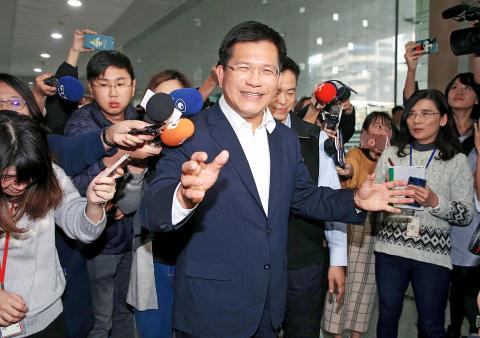Minister of Transportation and Communications Lin Chia-lung (林佳龍) yesterday said that his administration’s policies would be more down-to-earth, adding that he would take Internet users’ opinions into account.
Lin made the remarks at his first meeting with the news media after he took office in the morning.
Lin has a doctorate in political science from Yale University and was Taichung mayor before losing to Lu Shiow-yen (盧秀燕) of the Chinese Nationalist Party (KMT) in the Nov. 24 local elections. Before that, he was the head of the now-defunct Government Information Office (GIO) during former president Chen Shui-bian’s (陳水扁) administration. He also served as a lawmaker, representing a constituency in Taichung from 2012 to 2014.

Photo: CNA
Asked how he plans to lead a government agency about which he has neither academic nor professional experience, Lin said he worked closely with the Ministry of Transportation and Communications (MOTC) in his capacity as GIO head.
For example, he oversaw the establishment of the National Communications Commission, which was formed by integrating the GIO’s broadcasting affairs department with the MOTC’s Directorate-General of Telecommunications, Lin said.
He cited cooperation with the Tourism Bureau and Chunghwa Telecom — in which the MOTC has a one-third stake — on international marketing campaigns and policies related to digital convergence respectively.
As Taichung mayor, he was involved in the planning of important transportation infrastructure and services, such as the Taichung MRT System, the iBike system and an electric bus service, Lin said.
“I was a local government official before I became minister of transportation and communications, and I know how people feel. The most important thing about government policy is that it must be down-to-earth,” he said.
“The ministry should not only focus on building infrastructure, but it should also care about serving the public. Government officials should look at policies from the public’s perspective and have complementary measures in place before they implement the policies,” Lin said.
His policies would follow the principles of “safety, efficiency, quality and eco-friendliness,” he added.
Commenting on the challenges facing the Taiwan Railways Administration (TRA), Lin said that it is necessary to conduct a comprehensive review of the railway agency’s operations, but added that some of the problems cannot be solved if the ministry does not tackle their root causes.
The ministry should help the TRA address its financial issues so that the agency can offer safe, efficient and quality services, Lin said.
He would also establish a special task force to resolve disputes between the TRA management and employees, he added.
Asked about Lu’s plan to cancel the construction of a railway line to connect the TRA’s Mountain and West Coast lines, which traverse Taichung, Lin said that the project has already been approved by Executive Yuan and is under way.
Local government officials should follow due procedure if they want to express their thoughts and doubts about the project, he added.
Following his defeat in November, Lin had said that he would not seek a position in northern Taiwan.
Asked about the remark, Lin yesterday said that he is a commuter and can take the high-speed rail or drive.

US climber Alex Honnold is to attempt to scale Taipei 101 without a rope and harness in a live Netflix special on Jan. 24, the streaming platform announced on Wednesday. Accounting for the time difference, the two-hour broadcast of Honnold’s climb, called Skyscraper Live, is to air on Jan. 23 in the US, Netflix said in a statement. Honnold, 40, was the first person ever to free solo climb the 900m El Capitan rock formation in Yosemite National Park — a feat that was recorded and later made into the 2018 documentary film Free Solo. Netflix previewed Skyscraper Live in October, after videos

Starting on Jan. 1, YouBike riders must have insurance to use the service, and a six-month trial of NT$5 coupons under certain conditions would be implemented to balance bike shortages, a joint statement from transportation departments across Taipei, New Taipei City and Taoyuan announced yesterday. The rental bike system operator said that coupons would be offered to riders to rent bikes from full stations, for riders who take out an electric-assisted bike from a full station, and for riders who return a bike to an empty station. All riders with YouBike accounts are automatically eligible for the program, and each membership account

A classified Pentagon-produced, multiyear assessment — the Overmatch brief — highlighted unreported Chinese capabilities to destroy US military assets and identified US supply chain choke points, painting a disturbing picture of waning US military might, a New York Times editorial published on Monday said. US Secretary of Defense Pete Hegseth’s comments in November last year that “we lose every time” in Pentagon-conducted war games pitting the US against China further highlighted the uncertainty about the US’ capability to intervene in the event of a Chinese invasion of Taiwan. “It shows the Pentagon’s overreliance on expensive, vulnerable weapons as adversaries field cheap, technologically

NUMBERs IMBALANCE: More than 4 million Taiwanese have visited China this year, while only about half a million Chinese have visited here Beijing has yet to respond to Taiwan’s requests for negotiation over matters related to the recovery of cross-strait tourism, the Tourism Administration said yesterday. Taiwan’s tourism authority issued the statement after Chinese-language daily the China Times reported yesterday that the government’s policy of banning group tours to China does not stop Taiwanese from visiting the country. As of October, more than 4.2 million had traveled to China this year, exceeding last year. Beijing estimated the number of Taiwanese tourists in China could reach 4.5 million this year. By contrast, only 500,000 Chinese tourists are expected in Taiwan, the report said. The report